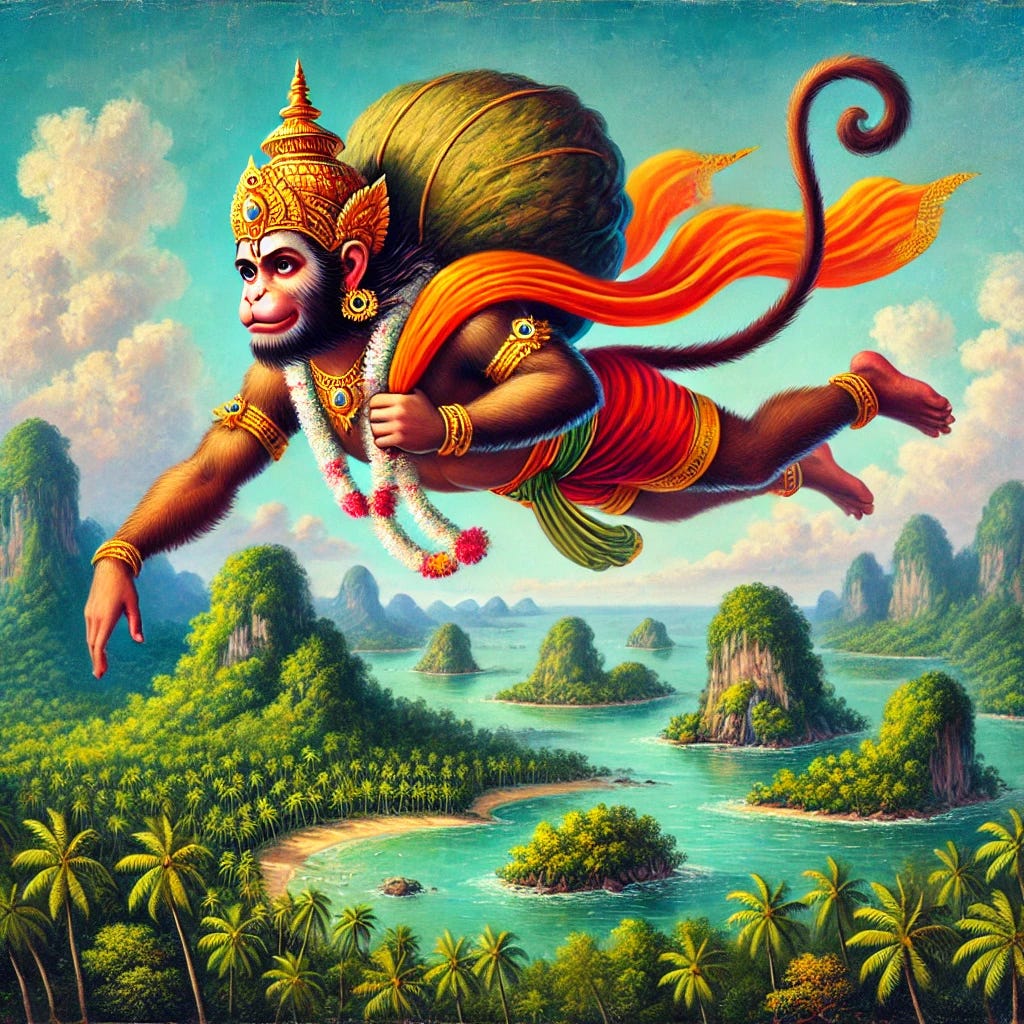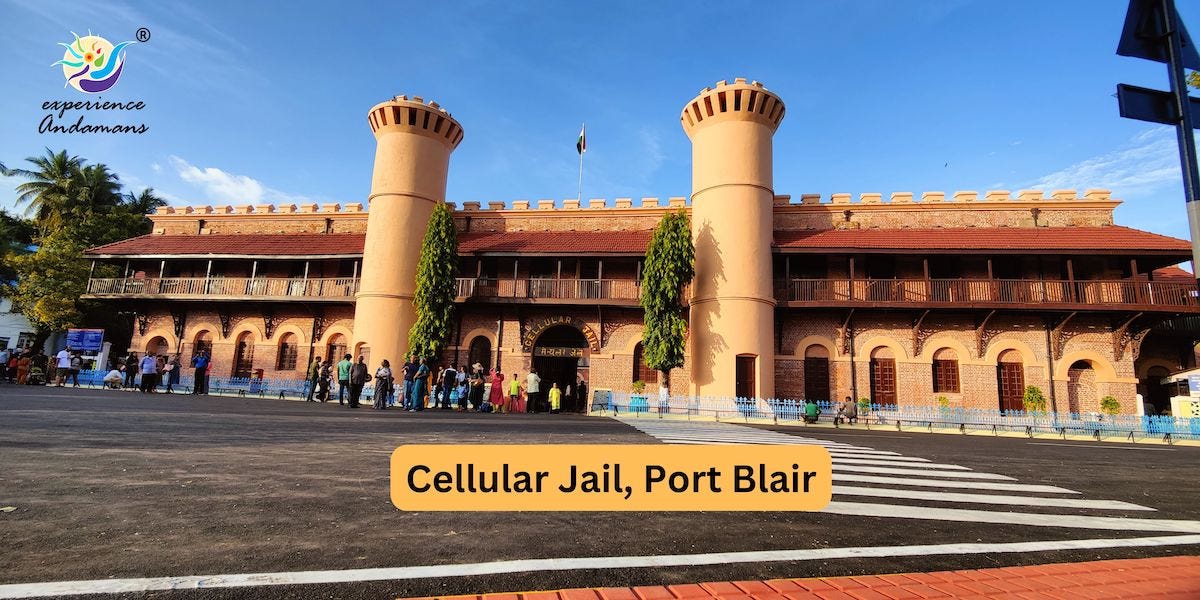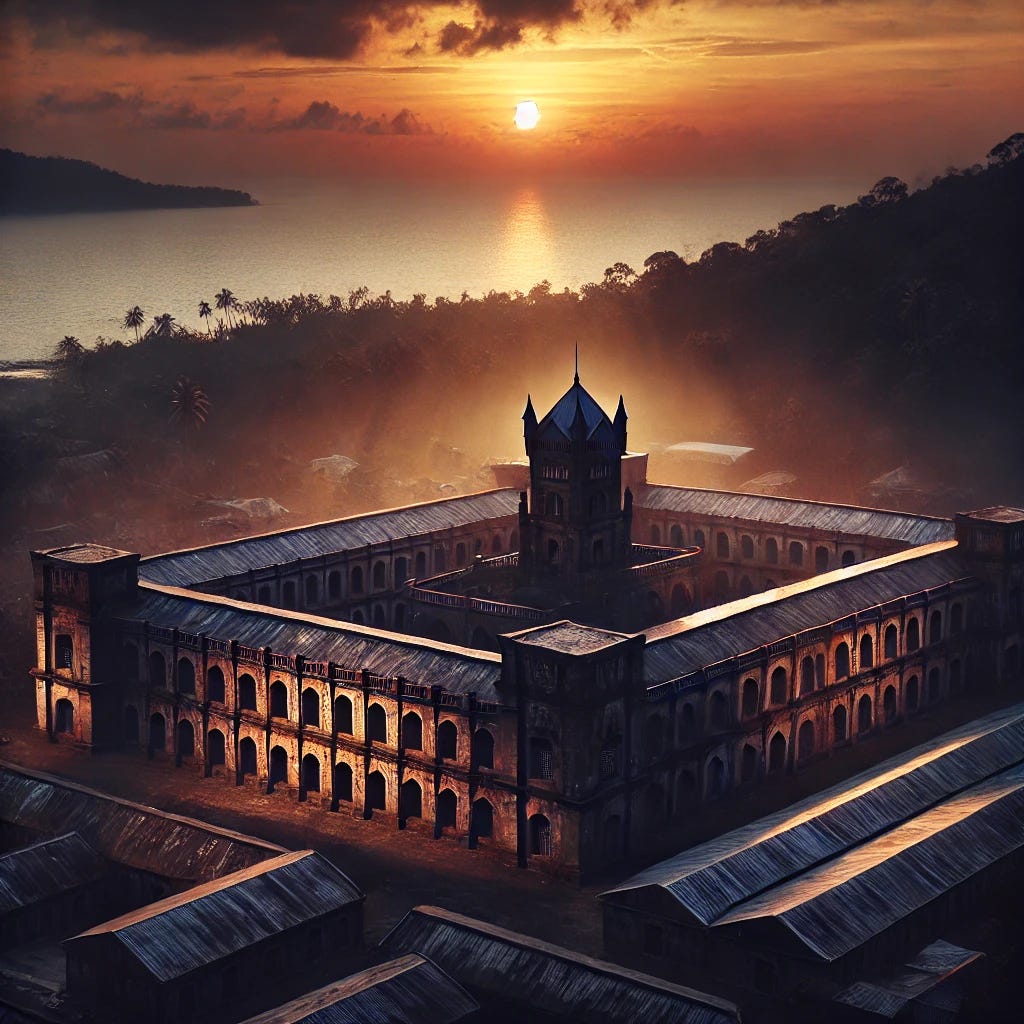Are the Andaman Islands Named After the Hindu God Hanuman?
A Missed Tribute to Netaji Subhas Chandra Bose and the Overlooked Martyrs of Cellular Jail, Including Diwan Singh Kalepani and Sher Ali Afridi.
If Port Blair Can Be Renamed, Why Not the Andaman Islands?
As India continues its campaign to reclaim and honour its rich history, the recent decision to rename Port Blair as Sri Vijaya Puram raises a compelling question: if colonial-era names are being replaced, why hasn't the name of the Andaman Islands itself been changed? The history and origins of the name ‘Andaman’ offer intriguing insights, especially when linked to Hindu mythology and the revered figure of god Hanuman. While Port Blair's name, rooted in British colonialism, has been shed, the name of the Andaman Islands remains—precisely on account of its deep, mythological connotations that predate British influence by millennia.
The Hanuman Connection: Mythology Meets Geography
The name "Andaman" is believed by many historians and scholars to be derived from the Hindu god Hanuman, an important character in the epic Ramayana. According to one popular theory, the Malay sailors, who knew the islands well, referred to them as the "Islands of Handuman." In Malay, 'Handuman' was their version of 'Hanuman,' reflecting a long-standing tradition of trade and exploration across Southeast Asia. Over time, "Handuman" morphed into "Andaman."
In the Ramayana, Hanuman’s journey to Lanka to help Lord Rama rescue his wife Sita is one of the most celebrated aspects of the story. While there are no direct references in the epic to Hanuman visiting these islands, the association is a product of oral traditions that expanded as trade routes between India and Southeast Asia flourished. These islands were regarded as a possible resting place for Hanuman during his legendary leap to Lanka.
This connection between the Andaman Islands and Hanuman places the archipelago within the context of ancient Indian mythology and theology, giving it a cultural significance that far predates the arrival of the British. The symbolic value of Hanuman as a figure of loyalty, strength, and devotion lends gravitas to the name "Andaman" and could explain why this name has survived, even as colonial-era names like Port Blair have been reconsidered.
Other Theories: Ancient References and Alternative Origins
Though the Hanuman theory is the most popularly accepted, there are other explanations for the name "Andaman." Some suggest that the name appears in Chinese texts from the 13th century as "ʔˠan H dɑ mˠan" in a book titled Zhu Fan Zhi, indicating that the islands were already known to Chinese explorers. In the 15th century, Chinese admiral Zheng He’s voyages also recorded the name as "Andeman Mountain."
Another theory posits that "Andaman" could be connected to the Roman cartographer Agathodaimon, whose maps of the ancient world included these islands. Yet, the Hanuman theory continues to hold the most sway, primarily because it ties the islands to an Indian cultural and religious framework, making the name deeply significant within the Indian context.
A Colonial Legacy: The Naming of Port Blair
While the Andaman Islands’ name has largely avoided change due to its mythological significance, Port Blair has had a much shorter and explicitly colonial history. Established as a penal colony by the British East India Company in the late 18th century, the area was originally named Port Cornwallis after Admiral William Cornwallis, a key figure in British naval history. However, when Lieutenant Archibald Blair conducted a thorough survey of the Andaman Islands, the port was renamed in his honour.
Blair, a naval officer and surveyor, played a pivotal role in identifying the strategic importance of these islands, leading to their use as a penal settlement for Indian freedom fighters during the British Raj. The notorious Cellular Jail in Port Blair became a symbol of British oppression, housing political prisoners, including prominent figures like Veer Savarkar. Despite its dark history, the name "Port Blair" persisted as a reminder of British colonial dominance.
A New Identity: Sri Vijaya Puram
In 2024, the Indian government took the significant step of renaming Port Blair to Sri Vijaya Puram. This new name draws inspiration from the ancient Chola Empire, one of the greatest maritime empires of South Asia, which exerted influence over the region, including the Andaman and Nicobar Islands. The word ‘Vijaya’ means victory, symbolising not only the triumph of India's freedom fighters but also the ongoing reclamation of Indian history from its colonial past.
The renaming of Port Blair is part of a broader pattern of replacing colonial-era names with those that reflect India’s indigenous history and culture. Prime Minister Narendra Modi’s government has been at the forefront of this effort, with earlier decisions to rename islands in the Andaman and Nicobar archipelago after Param Vir Chakra (PVC) recipients, honouring the bravery and sacrifice of India’s war heroes. These efforts aim to reclaim India's geographical and historical spaces from colonial vestiges, and the renaming of Port Blair serves as a powerful example of this shift.
Honouring India's Heroes: Renaming the Andaman Islands
In 2023, as part of this nationalistic wave, 21 islands in the Andaman and Nicobar archipelago were named after recipients of the Param Vir Chakra, India’s highest military honour. This move reflects a conscious effort to replace colonial names with Indian ones that commemorate the bravery and sacrifices of soldiers who have defended the nation.
Among the islands renamed were those that honoured the memory of Major Somnath Sharma, the first recipient of the PVC, and Captain Vikram Batra, whose heroism during the Kargil War became legendary. By associating these remote islands with such towering figures in Indian military history, the government sought to ensure that these heroes’ legacies are etched into the very landscape of the nation.
Why Has ‘Andaman’ Survived?
If colonial names like Port Blair are being replaced, why has the name ‘Andaman’ endured? One reason is likely its association with Hanuman, a figure so deeply embedded in Indian culture and mythology that his name resonates beyond geographical and historical contexts. Unlike Port Blair, which is inextricably linked to British imperialism, ‘Andaman’ speaks to a broader, pre-colonial Indian narrative. Its origins in myth and folklore give it a timelessness that colonial names lack.
Moreover, the name ‘Andaman’ ties India’s cultural and religious past to its geographical present, making it more than just a name. It is a connection to an ancient story that has been passed down through generations. In this sense, while names like Port Blair are seen as remnants of a colonial past, ‘Andaman’ is a part of India’s spiritual and cultural identity.
A Missed Tribute to Netaji Subhas Chandra Bose
The renaming of Port Blair to Sri Vijaya Puram has sparked considerable debate, with many voices of dissent questioning the decision. A significant section of critics argue that the renaming should have been dedicated to Netaji Subhas Chandra Bose, who played a pivotal role in India's fight for independence during World War II. Bose’s Indian National Army (Azad Hind Fauj) captured the Andaman Islands, including Port Blair, in 1943 after launching from Singapore. This was one of the earliest symbolic victories over British rule, even before India officially gained independence on 15 August 1947. Dedicating the renaming to Netaji, they argue, would have honoured the profound significance of this historical moment in India’s freedom struggle.
Overlooking the Martyrs of the Cellular Jail
Moreover, the infamous Cellular Jail, known as “Kala Paani,” where countless freedom fighters were imprisoned for life, remains a symbol of India’s tortured past under British rule. Many believe that a tribute to these freedom fighters, including patriots like Diwan Singh Kalapani, who was martyred in the prison for his unwavering resistance to colonial forces, would have been a more fitting recognition of the island's painful yet heroic history. Dissenters suggest that the renaming appears to reflect less of an intention by the Modi government to erase colonial legacies and more of a shift towards steering the narrative of a Hindu Rashtra. The omission of tributes to Bose, Sikh as well as Muslim freedom fighters, and other revolutionaries raises questions about the broader implications of the renaming in the context of India’s diverse historical narrative.
Sher Ali Afridi: A Forgotten Rebel Against British Rule
Sher Ali Afridi, a Muslim freedom fighter from the North-West Frontier Province (now part of Pakistan), etched his name in history by assassinating Lord Mayo, the Viceroy of India, on February 8, 1872, in the Andaman Islands. At the time, Sher Ali was serving a life sentence in the notorious Cellular Jail, having been convicted of a murder he claimed he did not commit. Seeing an opportunity to strike at the British Empire, Sher Ali fatally stabbed Lord Mayo with a knife he had acquired while working as a barber in the prison. This bold act of rebellion, carried out 75 years before India gained independence, was a symbolic blow against British colonial rule. Before his execution on March 11, 1872, Sher Ali remained unrepentant, expressing pride in his actions as a service to his country's freedom struggle.
The Overlooked Legacy of Sher Ali Afridi
Despite the significance of his defiant act, Sher Ali Afridi's legacy remains largely forgotten in the annals of Indian history. Unlike other iconic freedom fighters such as Shaheed-e-Azam Bhagat Singh, Shaheed Kartar Singh Sarabha and Shaheed Udham Singh, Sher Ali’s name seldom appears in mainstream narratives. His relative obscurity may be attributed to several factors: the political complexity of the North-West Frontier, the passage of time, and perhaps the geographical distance from the core regions of India’s independence struggle. However, his assassination of one of the highest-ranking British officials in India stands as a powerful testament to the contributions of Muslim freedom fighters from the frontier regions. Reviving Sher Ali Afridi’s story could help paint a fuller picture of the diverse resistance against British rule and acknowledge the varied forces that shaped India’s quest for independence.
The Larger Question: Time to Quit the Commonwealth?
As India moves to reclaim its historical and cultural identity by renaming cities and islands, a larger question looms: should India also reconsider its relationship with the Commonwealth? The Commonwealth, an organisation that evolved out of the British Empire, represents a shared history with its former colonies. However, for a nation increasingly intent on removing colonial imprints, does continuing membership in the Commonwealth align with India's aspirations as a sovereign and independent global power?
What's in a Name?
To quote Shakespeare, "What's in a name?"—but in our opinion, it’s everything. Whether it's India, Bharat, or the more frequently used colloquial Hindustan, each carries its own connotation, evoking different eras and sentiments. It’s not merely about correcting history or rewriting it; it’s also about shaping a collective memory and a shared reality for the people. The decision to rename Port Blair is indeed a step in the right direction, but it’s equally important for more people to know that Andaman derives its name from Hanuman.
Jai Bajrang Bali!1





